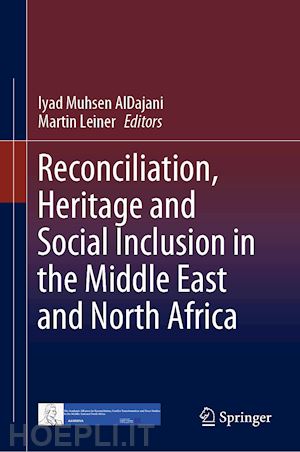
Questo prodotto usufruisce delle SPEDIZIONI GRATIS
selezionando l'opzione Corriere Veloce in fase di ordine.
Pagabile anche con Carta della cultura giovani e del merito, 18App Bonus Cultura e Carta del Docente
This book, sponsored by the Academic Alliance for Reconciliation Studies in the Middle East and North Africa (AARMENA), focuses on peacebuilding, conflict transformation, and shifts toward approaching the reconciliation process as an inter-, trans- and multidisciplinary field. The research presented in the series focuses on the Middle East and North Africa, highlighting contributions by practitioners and scholars alike.
This volume showcases research on Heritage, Reconciliation, and Social Inclusion in the Middle East and North Africa. It reflects various inter-, trans- and multidisciplinary approaches applied both theoretically and practically, and explores conflict transformation and transitional shifts towards peacebuilding and reconciliation in the MENA (Middle East and North Africa) region.
The content is divided into five sections, the first of which examines the importance of reconciliation, peacebuilding, and social inclusion in contributionsby experts in the field such as Martin Leiner, Wolfgang Dietrich, Mohammad Abu Nimer, Mohmmad Alshraideh and Iyad Aldajani. The second and third section explore digital humanities and the research sciences respectively, while the fourth turns to practices of heritage and reconciliation. The fifth section presents case studies on practices, conducted by expert researchers for heritage, reconciliation, and social inclusion in higher education.
Dr. phil. Iyad Al-Dajani is a researcher and an expert on violence and religious peacemaking and reconciliation through applied Internet communication technologies (ICT) and online social networks and media analysis. In addition, he researches Digital Humanities (Data Science) in innovative studies such as methodologies and analytics, primarily concerned with Applied Ethics, Practical Philosophy into methods used for ICT technologies, and researching theories of Applied Phronesis in ICT.
Most of Dr. Al-Dajani's research areas are in Applied Computer Science and Digital Humanities for reconciliation process and peace education. He earned his Ph.D. and Dr.Phill title from Friedrich Schiller University and was awarded a certificate of completion for the Executive Education Program from Harvard Kennedy School of Government at Harvard University in cybersecurity: The intersection of policy, and in Leading in Artificial Intelligence and Exploring Technology and PolicyPrograms. A certificate from Oxford University in the Oxford Artificial Intelligence program from Saïd Business School, and a Reference Class Forecasting practitioner for the Oxford Global Projects Academy. Masters in Regional & American Studies, and B.S. in computer science."
Dr. Al-Dajani received his Ph.D. in Communication Science from Friedrich-Schiller University and specialized in Applied Phronesis in Internet Communication Research Methodologies. He is a Certified Analyst using Nvivo for Windows in applying academic research methodologies for researching Data Science. Author of a book—Internet Communication Technologies for Reconciliation, Applied Phronesis Netnography in Internet Research Methodologies—Dr. Al-Dajani has also decided to go deep into the highly dynamic field of scientific approaches to the Internet Big Data and Reconciliation Studies.From 1998 to 2002, Dr. Leiner was Assistant Professor and Professor for Systematic Theology and Hermeneutics at the University of Neuchâtel, in the Francophone part of Switzerland. From 2000-2002, he was the President of the Institute Romand de Systématique et d´Éthique (IRSE) in Geneva and has been a permanent member of the Board of the Ethikzentrum at the FSU since 2003.











Il sito utilizza cookie ed altri strumenti di tracciamento che raccolgono informazioni dal dispositivo dell’utente. Oltre ai cookie tecnici ed analitici aggregati, strettamente necessari per il funzionamento di questo sito web, previo consenso dell’utente possono essere installati cookie di profilazione e marketing e cookie dei social media. Cliccando su “Accetto tutti i cookie” saranno attivate tutte le categorie di cookie. Per accettare solo deterninate categorie di cookie, cliccare invece su “Impostazioni cookie”. Chiudendo il banner o continuando a navigare saranno installati solo cookie tecnici. Per maggiori dettagli, consultare la Cookie Policy.